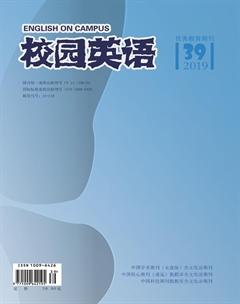Exploration of cabin English under the concept of ESP
【Abstract】 Cabin English is a compulsory course for students majoring in cabin attendant. Based on the characteristics of students, this paper attempts to explore a task-based cabin English teaching model that pays equal attention to language and skills starting from teaching and classroom teaching.
【Key words】 ESP; cabin English; task-based teaching
【作者簡介】刘钇彤(1989-),女,山东滨州人,滨州学院,助教,硕士,研究方向:乘务英语口语、英语教学。
【基金项目】2018年第二批教育部产学合作协同育人项目《ESP理念下乘务英语混合式教学探索与实践》;项目编号:201802086041。
1.introduction
From the linguistic perspective, Cabin English belongs to the category of English for Specific Purpose (ESP). Domestic colleges generally offer such courses in the second year, which can be subdivided into spoken English, listening comprehension and intensive reading. The purpose is to make students master the specific industry terms, familiar with the standard pronunciation and intonation, discourse structure and meet the needs of employment. How to cultivate high-quality graduates of cabin attendant major who are not only proficient in language ability and service skills but also rich in culture is always the direction of teachers efforts.
2.Teaching concept
General English places too much emphasis on the application of basic language skills such as listening, reading, writing and translating oriented to the test. The lecturing in classroom is too long that the students have little time to take the initiative in class. Moreover, General English is mainly focus on knowledge while cabin English, as a professional English, needs to be guided and cultivated by professional skills and talents in various aspects. Teachers should also train students communication skills, teamwork skills, planning and design skills, problem solving ability and self-management ability by feasible methods. A teacher must be flexibly transform from a lecturer to a facilitator, an assessor or other roles. He is competent as a director and is also qualified to be a trainer.
3.Teaching method
In cabin English teaching, teachers can adopt task-based teaching as an effective teaching method, aiming at the “application oriented” learning motivation and the personality characteristics of “willing to perform”. The core is “learner-centered”. Its educational foundation is derived from the pragmatism of John Dewey in the United States. The teaching design emphasizes “learning by doing, learning in using”. Once learners experience the meaning of participating in activities and feel the success of new knowledge construction, they will be more active and thus accelerate the internalization of language information.
Typical “task-based” teaching include pre-task preparation, during-task implementation and post-task reflection. Each unit, teachers can design the content into work orders. Before the task, students log on the website to observe the simulated video of the course, get familiar with the content and requirements of the task. In the task implementation and evaluation stage, the teacher can refine this module into subtasks. Let students find the deficiency after they demonstrate in the cabin. In this process, students are both participants and evaluators. Teachers guide and evaluate the whole process. Reward creative and outstanding groups. In the post-task stage, they will finish a Written Report, expressing the gains and shortcomings in the implementation of the task and draw up improvement measures. Teachers need to give interactive communication in the data background.
Besides the role of flight attendant and passenger, students can also play the role of teacher in theoretical class, who will edit and direct a classroom task by using cabin, language lab and relative film resources to show their skills. Announcement competition, Cabin scene drama and other forms of tasks are also encouraged. Corporate culture of different airlines can also be introduced, especially the case of excellent domestic and foreign airlines.
4.conclusion
Effective teaching ideas need to be equipped with effective teaching methods and the mind of teaching design. In ESP teaching, teachers should give full play to their various roles and effectively implement task module teaching. At the same time of cultivating students English ability of cabin crew, the task-based teaching mode of “paying equal attention to language and skills, and integrating culture and emotion” is finally realized.
References:
[1]劉法公.论专门用途英语的属性与对应教学法[J].外语与外语教学,2001(12):25-27,30.

